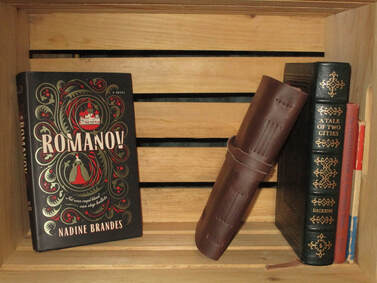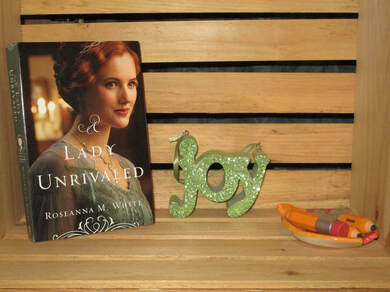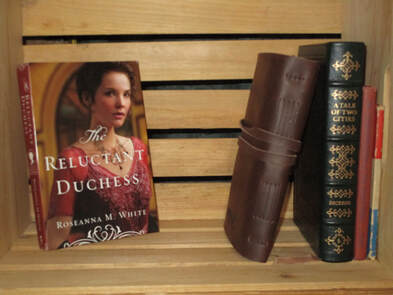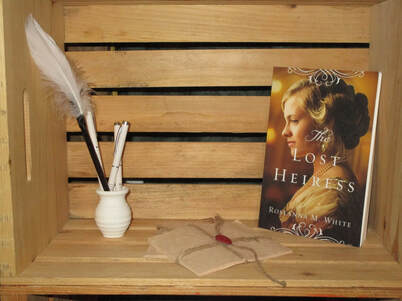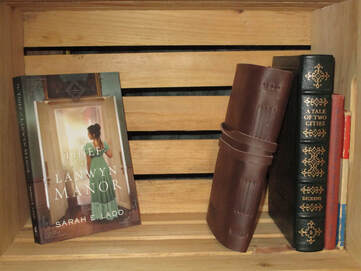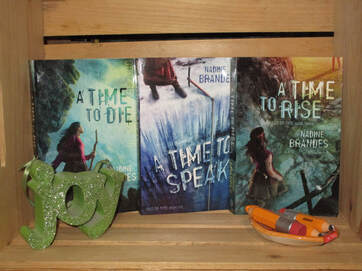|
Even royal blood can't stop bullets.
Sorry, it was just such a great line I had to steal it. Anastasia Romanov has been exiled with her entire family. But that's not even it. She's been exiled to a house with only a couple rooms reserved for them. She's been exiled away from any help or rescue. She's been exiled away from the guards she's befriended and into the hands of a bloodthirsty commander. Did I mention the spell she's smuggling with her? Romanov is the beautiful, tragic story of a family trying to stay together. It's the story of the daughter left behind and the soldier who tried to kill her. It a story of forgiveness for everyone . . . even the darkest, blackest villain. The characters explode from the pages. Anastasia is a brilliant protagonist that draws us into her struggles and makes us smile with her pranks. Zash draws us in in his own way, too as he tries to escape his tortured past and the mistakes he's made. And Alexei--enough said. Best brother I've read in a book. Despite the fact that he is the weakest, that he hurts the most due to a genetic condition, he gives strength to Anastasia and Zash both. Allow me a brief moment to compare Romanov to Fawkes, if you don't mind. That's the only thing I can come up with that is even remotely a complaint. In Fawkes (Nadine's other historical fantasy), the magic and the history blend together seamlessly, brilliantly. In Romanov, the magic and the history feel like two pieces to the a puzzle--forming the same picture, clicking together, but not blending together. As I have mentioned before, one of the things I love about Nadine Brandes' writing is her view on mercy. The protagonists even hand second chances to the villain who killed Anastasia's family. As to how that goes . . . well, I won't ruin it for you. Romanov is a book with many layers, not unlike Anastasia's spell doll. I, for one, will be re-reading it over and over to get to all those amazing layers.
0 Comments
Ella Myerston didn't mean to take the earrings with her. Honest, she didn't. She just forgot. Or maybe she lost them, like she does with almost anything else entrusted to her care.
No matter. It was high time her brother involved her in this Fire Eyes business anyway. After all, she's not a child. But the lord after the Fire Eyes has already been thwarted twice. His sister has been broken. His best friend has been killed. All in the name of the diamonds now swimming in the abyss of Ella's jewelry box. Either way, it ends here. The conclusion to the Ladies of the Manor trilogy feels like a return. This book matches more of the "Roseanna White" style I'd come to know and love from her other series. The characters spring to life from the pages once again. Ella's optimism never failed to lift my spirits, no matter the bleak circumstances she stared down. Her and Lord Cayton's banter never failed to make me smile. And Ella's unfailing trust in God never failed to inspire me. One of the things I love about Roseanna White is how she takes a sensitive look at the reality of depression. She did it in On Wings of Devotion and she does it again here. She offers more than just an annoying, sniveling, whiny character. She gives us a real character, with real struggles. She makes us understand, to go deeper. There were a few parts that were a bit murky and confusing. The climax builds to a big showdown between basically every character I came to love and the villain. I won't tell you how it ends, but suffice it to say, a gun is fired. The paragraphs describing that make it unclear who shot it. This issue is explained only a chapter later, but it still puzzled me and took a little bit away from the climax. And by a little bit, I mean the teeniest bit possible. Ella truly is a lady unrivaled. And this was an unrivaled finale to the Ladies of the Manor trilogy and the saga of the Fire Eyes diamonds. Snap.
Just like that, Brice Worthing has a wife. Just like that, Rowena Kinnaird becomes a duchess. And just like that, they're stuck together for life with someone they can't dream of understanding. Just like that, Rowena is thrust into a world she's never understood. But she's saved from her father and her abusive would-be suitor. And just like that, she becomes an integral piece--a pawn, really--in the scheme to recover the priceless Fire Eyes diamonds. Much like its first installment (The Lost Heiress), The Reluctant Duchess starts off slow. It has a completely different style than Roseanna White's other series. But it finds its footing in the climax. Also much like its first installment, keeping the players straight can be a task at times. Thankfully, there's also the helpful "cheat sheet" in the front. Rowena is probably my least favorite character in the trilogy. She was a wee bit gullible, especially considering her backstory. It makes Brice's patience with her all the more inspiring. Some of the supporting characters are less vibrant than other works of Roseanna White's. This book isn't all frills and romance. It's very real. It shows the struggles of loving someone who doesn't love you back. I could not believe Brice's patience at times. It teaches us by showing us what loving well looks like. Due to Rowena's past abuse, this book does also have some more mature content in it. It is handled very, very tactfully and well, with no graphic descriptions. The Reluctant Duchess feels a bit like its heroine at times--reluctant. But that doesn't mean you should be reluctant to pick it up. Close your eyes and imagine.
Imagine that you've lived in France for as long as you remember. The daughter of an actress, but raised as a princess. (It's complicated.) Now imagine that one day your oldest friend (who may be more than a friend, but that's for another time) delivers the news that you are not their daughter, but the daughter of an English lord. Imagine that English lord has thought you were dead all these years from the same carriage accident that took your mother. Imagine you move back to live with him and relatives you never knew you had. Imagine the papers stalk you, dubbing you The Lost Heiress. And can we throw in some rubies with a supposed curse over them? I think we can! Welcome to the life of Brook Eden, a very interesting character in her own right. She's all girl, but with a fiery temper and a will to try anything and everything. Maybe that's what keeps her going through all the adjustments of the book. Honestly, I would read this whole book just for Brook's father, Whitby. He may be the best father I've ever read in a book. He loves Brook to pieces, accepts her no matter what, and doesn't really care what society thinks of him. His and Brook's relationship was excellent. This was actually the first novel Roseanna White ever wrote, when she was twelve years old. While a superb read, just like her other books, I will note that it has a slower pace than her other series (Shadows Over England and The Codebreakers), a pace that picks up like Brook's wild stallion by the end. Due to the titles and whatnot of the time period (I mean, really, did everybody have three names or something?), it's important to keep your players straight. There's a helpful list of characters at the beginning that helped me accomplish just that. One of the things I love about Roseanna White's books is that she never backs down from the truth about God in her stories, and The Lost Heiress is no exception. The first book of the Ladies of the Manor series may not quite live up to her later series. But it certainly has a fire all its own. Julia Twethwey came to Lanwyn Manor to escape her broken heart.
She didn't come to get caught between the miners and the mine owners. She didn't come to investigate strange noises in the manor at night. She didn't come to confront the thief stealing their valuables. And she certainly didn't come to have to choose between her aunt's preference of Matthew Blake and her affection for his twin, Isaac Blake. Apparently, no one told the thief of Lanwyn Manor that. This book is much like its first installment The Governess of Penwythe Hall. A gentle story that just kind of rolls along. Lots of loose threads dangle throughout the book, only to be woven in at the end. Just when you think things have leveled out, the stakes up just enough to keep the story going. As a main character, Julia could be a bit annoying. A bit weak. But the longer I thought about it, and the more I read, I wondered if maybe that wasn't such a bad thing. After all, the whole story is about Julia discovering her weaknesses aren't such a hindrance as she thought. It's a good reminder for us as well. The thing I found most interesting about this book was Matthew and Isaac's relationship as twins. They've been close all their life, but now their beliefs are taking them in different directions, directions at odd with each other. It's interesting watching them navigate this and makes for an interesting twist when a villain gets their identities confused. For all the inspirational thoughts in this book, however, there is no mention of God. I missed it and hope to see it return in the final installment of this series. Does it have weaknesses of its own? Perhaps. But The Thief of Lanwyn Manor still stole a couple hours of my time anyway. And I'm not sorry in the least bit. How would you live if you knew the day you'd die?
Because Parvin Blackwater actually does, thanks to the Clock by her bedside. Everyone has them now--government-issued Clocks that count down to the day they die. And her Clock tells her she's got one more year left. What's one more year when she's wasted seventeen of them? What can she do in one year that will make her remembered forever? It's perfectly logical, isn't it? Become her own biographer, of course! Of course, I don't think she was intending that to include crossing the wall from her home to the uncharted worlds of the West. Or stumbling across an invention that could change the Clock system forever. Or gathering a Radical army to bring the wall down. Let me start out by saying I have never read anything quite like the Out of Time trilogy before. I'd never read a dystopian book. I'd never read a science fiction book. I'd never read a futuristic book. So there was a certain weird factor to get past. In some things, Parvin's society has advanced from ours. In others, it's regressed. But once I got my feet under me, I started on the journey with Parvin. It is a journey, so sometimes I read a page and wondered how exactly that was relevant to the rest of the story (hint: it was, I just had to read further). I lost track of how many characters Parvin met along her journey, each of them unique and vibrant. And let's not forget Parvin's voice as she narrates the journey! Her character arc from the insecure girl in the first book is incredible. Each book in the trilogy got better both in style and in plot, and that's saying something because the first one was excellent. One of the things I found most interesting about this book was the characters' view of mercy--even when it comes to their enemies. The characters choose not to participate in riots, give their enemies second chances, even going so far as to take a wounded villain to the nearest town . . . by dogsled. It's a refreshing change, in all fiction, but young adult fiction especially. By the end of the trilogy, Parvin doesn't have all the answers. And the answers she does have, she went through a lot to learn. Sometimes she makes mistakes. Big mistakes. And we learn from them, just as she does. We learn what it truly means to live. The Out of Time trilogy will live on in your thoughts long after you've read it . . . and maybe, just maybe it will change your life. |
Rachel's Reads
Hi there! Rachel again. Check out this section for book reviews and cover reveals of some of my favorites! Archives
June 2023
Categories
All
|
